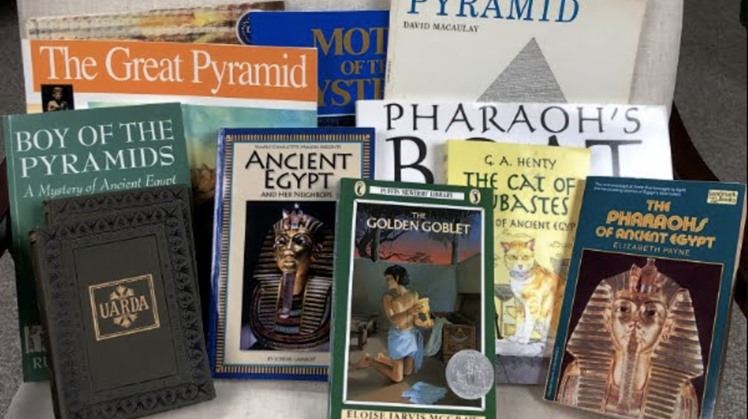Perhaps the consolidation of the Egyptian identity and the dissemination of the components of literary, artistic and heritage culture among the groups of society, as well as the promotion and dissemination of societal culture values, is one of the main roles of the Ministry of Culture, but there are also several ministries responsible for promoting the concept of the Egyptian identity, especially among young people and youth, and they are the Ministries of Education and the Ministry of Education Al-Aali, as the interest in teaching books that deal with the nature of the Egyptian personality, and our cultural and civilizational identity among children, is the first building block in his knowledge formation, and in strengthening his concept of citizenship.
The truth is that the Egyptian culture is multi-conceptual, given the great cultural and archaeological diversity that Egypt enjoys, and in the following lines we present a number of books and titles that we recommend to the Ministry of Education, as curricula that can contribute to enhancing the awareness of the Egyptian child and youth of his cultural identity and the multiplicity of its cultural tributaries, and the formation of His awareness of research in the past and its relationship to the present, and its relationship to cultural action, and stands before the features of the identity of Egyptian culture, including..
The dawn of conscience
Breasted was preoccupied with Egypt and its civilization, so he said in the introduction to his book "In the Life of the Hunter in the Prehistoric Era", who was struggling among the huge savage mammals that surrounded him, he began to hear a whisper from a new world whose dawn was emerging from within, and this whisper was A new trumpet differs from the whispering of the pain of hunger or fear that a person feels in order to preserve his being, as this trumpet was not limited to moving only one sense, leaving all other feelings calm and reassuring, but rather moved for the first time all psychological factors together. So what is the source from which all these inner voices came out, and how did it acquire that commanding power in the individual human life, and how did it rise until it became a firm and dominant force in human society? There is no doubt that this was a great progress and a fundamental change.
The dawn of conscience
Egypt character
The book, The Personality of Egypt, A Study in the Genius of Place, is an important reference for anyone who wants to know the geographical nature of Egypt. He is right to study the personality of Egypt in three main parts: the natural, human, and complementary personality. From civilized, human and natural factors to make it a unique place that differs from everything that surrounds it. In the first part: "Egypt's Natural Character," the writer presents what is related to Egyptian geology and geography, and the Egyptian deserts, which represent the largest percentage of the area of Egypt, whether western or eastern. Of course, the writer devotes a special part to the Nile Valley, the lifeline of Egypt.
beauty
The seven pillars of the Egyptian character
The book of the Egyptian thinker Milad Hanna, which consists of "Pharaonic affiliation, the Greco-Roman era, the Coptic era, the Islamic era, affiliations by virtue of place, Arab affiliation of Egypt, Egypt's affiliation with the Mediterranean, Egypt's affiliation with Africa." Milad Hanna says, "My belief is that these affiliations or pillars The seven are included in the human structure of every Egyptian, but logically and naturally they are not pillars of equal length, diameter, and strength.
The seven pillars of the Egyptian character
Egyptian Sinbad
The book "Sinbad Masry" by Hussein Fawzi tours the history of presenting a special vision of her condition throughout the various historical periods. It also sheds light on the most prominent transformations and attitudes that contributed to the formation of the Egyptian character. The book also seeks to highlight the sacrifices made by the Egyptians throughout history, and their constant struggle for freedom. Dignity and the right to self-determination, and the book consists of three sections, the first entitled "Darkness", the second "The White Thread, the Black Thread", and the third "Light".
Egyptian Sinbad
Genesis of Egypt
The book is small in size, its first edition was published in 1957, and in its introduction, Muhammad Shafiq Ghorbal says under the title Egypt is the gift of the Egyptians. The matter is that we deal with selected aspects and elected topics, for example: the interaction in the history of Egypt between the principles of continuity and change, the factors of social cohesion, the place of the individual in society, and the differences between the city and the countryside.
Genesis of Egypt
In the origins of the Egyptian question
The book “On the Origins of the Egyptian Question” by Sobhi Wahida, was published in the year 1950 and divided by the author into five chapters. About its relationship with the old West and stayed away from the economic, intellectual and social developments that took place in it.
Egyptian national character
In the book, Taher Abdel Hakim indicates that Egypt witnessed many violent revolutions, despite rumors of truce and surrender, and the first peasant revolution took place in 2280 BC during the reign of Pepi II, a revolution that could be recorded historically. Their persecution at the hands of the Romans after the Egyptian Church entered into a national religious struggle against the Western Church.
 Tue, May. 23, 2023
Tue, May. 23, 2023